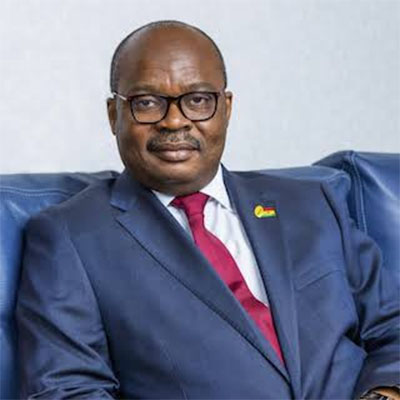Dr. Ernest Addison – Governor of BoG
THE STATE-owned Development Bank Ghana (DBG) has finally been granted a licence to begin operations.
Ken Ofori-Atta, Minister of Finance, who disclosed this in Parliament yesterday, when he presented the 2022 national budget, said the Governor of the Bank of Ghana (BoG) formally handed over the licence for DBG on Friday, November 12, 2021.
He said with the establishment of DBG, Government would “provide a powerful response to a long-standing desire of our businesses to easier access to medium and long-term loans at affordable interest rates. Not only will DBG, as a whole sale bank provide loans to financial institutions, it will also provide partial credit guarantees to complement the efforts of GIRSAL in agriculture and agribusiness.”
“Following the extensive financial sector reform coupled with the establishment of the Development Bank Ghana, the conversion of the Ghana Amalgamated Trust (GAT) into a permanent investment vehicle, we now have a robust financial ecosystem that will support businesses from the early to mature stage,” he assured.
In September, this year, the BoG approved a provisional licence for the DBG to commence work.
However, the approval came with certain conditionalities without which the bank could not operate. These included the appointment of a Chief Executive Officer for the bank, the formation of a board of directors and the provision of a minimum capital requirement.
According to the BoG, a minimum capital of GH¢800 million was required for a bank like DBG. The BoG, in March this year, came out with the minimum capital requirements for the various classes of development banks to be established in the country.
The minimum capital requirement for a Class 1 Development Bank (wholesale development finance institution) licence was set at GH¢800 million while a Class 2 Development Bank (retail development finance institution) needed to have GH¢600 million. Class 3 Development Bank (guarantee development finance institution) expected to have a minimum capital of GH¢300 million while for a Class 4 Development Bank (development finance institution) the institution’s activities it intends to undertake in development finance, will determine.
In the case of full or majority foreign ownership, the Bank of Ghana said not less than 60% of the required capitalisation or contribution shall be brought into Ghana in convertible currency.
Government is said to have engaged some four different international financial institutions – KfW, World Bank, AFD and European Investment Bank (EIB) – to help establish DBG.
It is expected that the combined resources from the aforementioned international institutions will amount to about $500 million, to be used as seed fund for DBG.
DBG will focus on transforming industries, agriculture, agro-processing, and housing and mortgage sub-sectors of the economy over the medium term.
When operational, DBG will deploy products and instruments such as credit guarantee funds, refinancing of Participating Financial Institutions (PFIs) loans, term loans, business development services and factoring, among others.
BY Samuel Boadi

